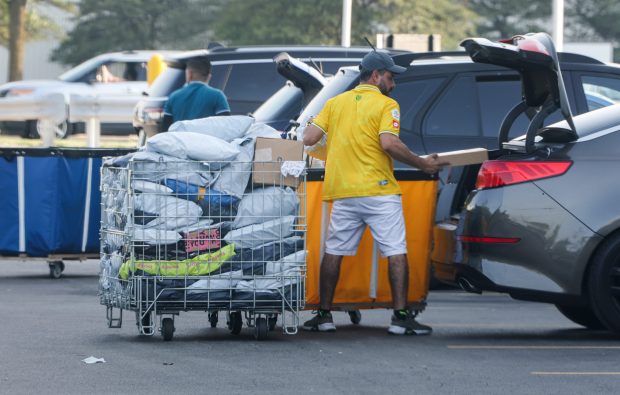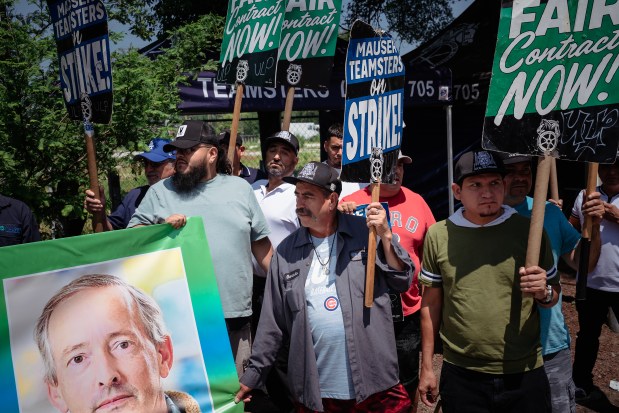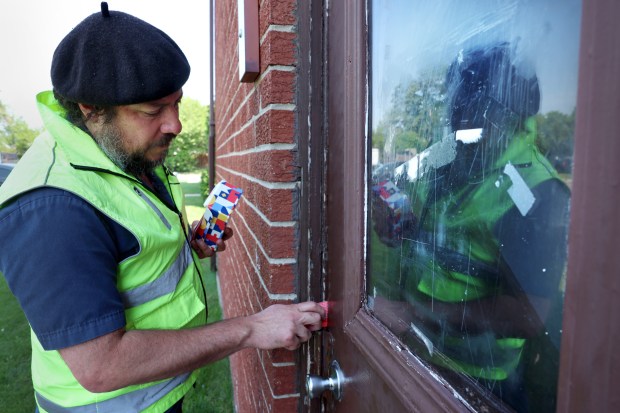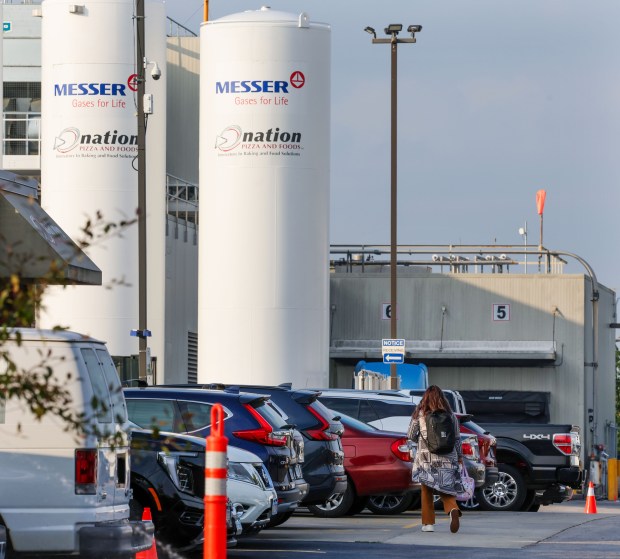Armando Gambino Hernandez was laid off in early April after 17 years working at the same pizza factory in the western suburbs.
He learned of his termination from several co-workers, who said Nestlé was acting on federal orders to fire all employees without legal documentation. Hernandez, 51, originally from Durango, Mexico, does not have legal status to be in the United States.
After almost two decades of steady work, he was suddenly forced to start over from scratch. He said more than 600 employees received notice of termination. Hernandez was given no compensation, he said, and wasn’t even allowed to retrieve his belongings from inside his locker.
“I loved my job,” said Hernandez, who used to leave his house on the North Side of Chicago before 3 a.m. to make it on time to Schaumburg to prepare the pizza mix.
“It’s been difficult since then. The little money we had saved — all of it ran out,” the father of four said.
Hernandez is one of thousands of factory workers who commute or live in the suburbs west of Chicago and have felt the economic effects of immigration enforcement intensify since President Donald Trump began his second term in office. Labor organizers in the area say the layoffs are just the beginning.
“Maybe right now it’s not very noticeable, but this financial impact will be seen,” said Gaby Hernandez Chico, a coordinator at the Casa DuPage Workers Center. “These families consume, buy food, buy things.”
The economic boost from immigrant communities is the invisible backbone of suburbs like Bensenville and Elgin, where for years, people without legal status were hired by various large companies like Nestlé without fear of federal enforcement of labor laws.
Now, community members say it’s more challenging to secure a job without proper documentation. Recordings of plainclothes officers raiding factories, approaching vehicles or setting up in vacant parking lots near homes have become commonplace on social media. People leave their homes each day, preparing for the eventuality that they might not return.
In a statement sent to the Tribune, a spokesperson for Nestlé said that it aims to fill the positions by “converting as many of our current temporary workers as possible and through direct hiring,” but did not specify how many of the 600-700 positions have been filled.
Nestlé stated it was “evolving the staffing model to be comprised of more full-time employees.” The spokesperson added that the company “complies with all applicable federal, state, and local employment laws, which is why all workers at Nestlé in the U.S. must be legally authorized to work in the country.”
Hernandez, the former Nestlé employee, called the Illinois Department of Labor, which reiterated that point.
“They told me I could come back to work if I had the proper papers,” he said.
Compliance and consequences
For factories and especially bigger operations, there are consequences to having employees without work authorization, though some presidents have enforced those federal mandates more than others. Employers use an online system called E-Verify, which allows them to confirm the eligibility of their newly hired employees to work in the country.
Financial penalties for hiring people without a federal I-9 form, officially known as the Employment Eligibility Verification form, can be in the millions, said David Sabathne, chief executive officer of the Western DuPage Chamber of Commerce.
“And then there’s the perception element of it,” he said. “If you’re a stock company, what do your shareholders say?”
Immigration advocates, however, argue that big businesses often have the money to protect themselves but not their workers. When workers are arrested or let go, their families are left scrambling to feed their children and pay rent.
A round of over 200 layoffs of undocumented workers in early June at Proven Partners Group in South Elgin prompted Northwestern graduate student Ismael Cordova-Clough, 28, to set up a food drive in his garage to support families who were struggling economically. He said he served meals to over 150 people in the community who had family members who had been laid off.
 Agents wearing black detain several people at the intersection of Chicago Street and Route 31 in Elgin in late April 2025. The individuals were arrested when agents stopped a van containing workers at this location. (Ismael Cordova-Clough)
Agents wearing black detain several people at the intersection of Chicago Street and Route 31 in Elgin in late April 2025. The individuals were arrested when agents stopped a van containing workers at this location. (Ismael Cordova-Clough)
One mother he spoke to had several family members who worked at the food packing plant. They were all let go, Cordova-Clough said. A few days later, she told him that her husband had been picked up by federal immigration agents on his way to work.
“They’re devastated,” he said. “They’re afraid.”
Proven Partners Group did not immediately respond to requests for comment about the layoffs.
Cordova-Clough has been highly involved in responding to U.S. Immigration and Customs Enforcement activity in the Elgin area and often posts videos and photos of ICE arrests in the community on social media, either taken by him or sent to him from Elgin residents. He thinks that companies will use staffing agencies to hire workers without legal status, a maneuver so the companies won’t be held accountable for violating labor statutes.
“Still, that doesn’t provide them the longevity of having a regular job,” he said. “And mind you, none of these jobs are sustainable for undocumented immigrants who are a little bit older.”
Workplace raids
In certain instances, recent immigration raids in the Chicago suburbs have led to the detention of employees who are legally permitted to work.
At least 20 people were taken into custody from a large grey warehouse operated by Accelerated Global Operations and SpeedX in Elk Grove Village on June 6, according to Kevin Morrison, 15th district county board commissioner. The company’s general manager told him afterward that everyone who was detained had a valid work permit, Morrison said.
“To this day, no one knows where they are,” he added. “Their families have not been able to communicate with them.”
 Workers load packages into vehicles outside of a warehouse that includes several businesses including SpeedX along the 2500 block of Busse Road on July 23, 2025, in Elk Grove Village. (Stacey Wescott/Chicago Tribune)
Workers load packages into vehicles outside of a warehouse that includes several businesses including SpeedX along the 2500 block of Busse Road on July 23, 2025, in Elk Grove Village. (Stacey Wescott/Chicago Tribune)
Elk Grove Police confirmed that the U.S. Department of Homeland Security had called to inform them that an operation was being conducted at the facility, which typically handles cargo and freight operations.
“They didn’t let us know the nature of what they were going to be doing out there, just that they were going to be having some people out there,” said Scott Eisenmenger, Elk Grove Village deputy police chief.
Local police is prohibited under state law from collaborating with federal immigration officials, and Eisenmenger said the call from Homeland Security was the only official notification his agency received in recent months from the federal agency.
Neither DHS or Accelerated Global Operations and SpeedX responded to the Tribune’s requests for comment.
‘We’re just asking for you to support us’
Under Trump, workers rights advocates say they are now spending less time fighting against workplace violations for undocumented workers and more time securing the basic right to work as an immigrant in the U.S. Some companies have proved unwilling to agree to immigration protections for their staff.
Just off a quiet residential street in Little Village, more than 100 Teamsters are on strike. Nearly seven weeks ago, they walked off their manufacturing jobs at Mauser Packaging Solutions, where they work reconditioning steel containers used to transport chemicals.
 Teamsters Local 705 members at Mauser Packaging Solutions hold a banner with the image of Mauser CEO Mark Burgess as they strike over working conditions and immigration concerns at the facility in the Little Village neighborhood, July 21, 2025. (E. Jason Wambsgans/Chicago Tribune)
Teamsters Local 705 members at Mauser Packaging Solutions hold a banner with the image of Mauser CEO Mark Burgess as they strike over working conditions and immigration concerns at the facility in the Little Village neighborhood, July 21, 2025. (E. Jason Wambsgans/Chicago Tribune)
The workers are seeking higher wages and improvements to their working conditions, but their union, the International Brotherhood of Teamsters Local 705, also wants Oak Brook-based Mauser to agree not to allow U.S. Immigration and Customs Enforcement officials onto workplace property unless they have a signed judicial warrant. So far, the company has refused to do so, said Nico Coronado, the union’s chief negotiator.
“They say that they don’t want to break the law,” said Arturo Landa, a shop steward at Mauser who has participated in the protracted contract negotiations. “We say, we don’t want you to break the law. We’re just asking for you to support us because we are your workers.”
Landa is from the state of Veracruz, Mexico, but has lived in Little Village for the last 18 years. Like many of the workers at Mauser, he is his family’s breadwinner: He is married with three adult children who live with him, he said. Landa has permission to work legally in the U.S., but still doesn’t feel safe.
“We’re scared, really, because of the color of our skin,” he said.
Mauser did not respond to requests for comment. Though the company has not agreed to the union’s demand surrounding ICE’s access to workplace property, it has, Coronado said, agreed to contract language that would give workers more time to address any inconsistencies in their I-9 documents and their Social Security numbers.
A quiet community
In Bensenville, for those who haven’t lost their jobs or had loved ones lose their jobs, the economic impact of immigration enforcement is still visible in empty commercial corridors, quiet barber shops and shuttered restaurants. Summer weekends, once lively with families in parks and around swimming pools, are quieter now. This slow, steady decline is subtly eroding the fabric of local life.
 A maintenance worker lugs cleaning equipment into a building at the Elm Court Apartments in Bensenville on July 21, 2025. The community has had numerous ICE raids over the last several months and dozens of people have been detained. (Stacey Wescott/Chicago Tribune)
A maintenance worker lugs cleaning equipment into a building at the Elm Court Apartments in Bensenville on July 21, 2025. The community has had numerous ICE raids over the last several months and dozens of people have been detained. (Stacey Wescott/Chicago Tribune)
Laundry hangs from balconies at an apartment complex in the southern part of town that, according to residents, has been repeatedly targeted by ICE since Trump took office. Children ride bikes and set up slip-and-slides in the grassy courtyards, surrounded by neatly kept hedges.
The complex houses a large Guatemalan community, especially vulnerable to raids, said Cristobal Cavazos, a coordinator at Casa DuPage. During a recent visit, he distributed red “Know Your Rights” cards and checked in on residents.
They reported that ICE has visited seven times in the last five months. Initially, the federal agency was able to detain more residents because they didn’t understand their rights, but now they stay inside when they see unfamiliar vehicles on site.
“These workers, just five years ago during COVID, were considered essential,” said Cavazos. “So there’s nothing rational about it — but then again, racism isn’t rational.”
 Cristobal Cavazos, co-founder of Immigrant Solidarity DuPage and Casa DuPage Workers Center, goes door-to-door handing out “know your rights” cards for families residing in the Elm Court Apartments on July 21, 2025, in Bensenville. (Stacey Wescott/Chicago Tribune)
Cristobal Cavazos, co-founder of Immigrant Solidarity DuPage and Casa DuPage Workers Center, goes door-to-door handing out “know your rights” cards for families residing in the Elm Court Apartments on July 21, 2025, in Bensenville. (Stacey Wescott/Chicago Tribune)
A woman named Azucena, from Guatemala, sat outside her apartment, balancing her 5-month-old baby boy on her knee.
“People like us really work ourselves to the bone. You throw yourself into the job,” the 30-year-old said, when asked how she thinks the threat of raids has impacted the local economy. “But now, people in this community, especially mothers, are deciding to skip work and stay home — afraid they’ll get taken and leave their little ones behind.”
The Tribune is withholding her last name, as she fears retaliation from federal authorities.
ICE did not respond to a request for comment about the raid.
Downtown, over a dozen business owners told the Tribune that their clientele has dropped by half because people are scared to walk around outside during the day. A bakery had to close its doors for the day recently after unmarked vehicles were spotted in a nearby parking lot. One new restaurant owner said that if she had known how hard it would be to make a profit, she wouldn’t have opened her restaurant at all.
Meanwhile, the manager of the Village Flower Shop, Pamela McNabb, said she only has American workers and therefore her business hasn’t been affected. She said she agrees with the Trump administration’s policies around immigration. Her family is from Italy, and she said that her dad “had to come the right way.”
“I don’t mind all of us coming together, I just want it to be the ones that we know,” she said. “We’ve got enough pedophiles and criminals here. We don’t need any extra.”
Nestlé
Most undocumented workers come to the U.S. for work opportunities, meaning they tend to range in ages from 25 to 64, according to the Washington, D.C.-based nonprofit American Immigration Council.
Studies cited by AIC indicate that undocumented immigrants are not displacing U.S.-born workers, but rather are filling jobs that few Americans are interested in pursuing in industries like food production and farming.
The nonprofit found that in 2023, as an example, about 5 percent of all workers nationally were undocumented, with a much higher proportion — 37 percent — of people filling physically arduous jobs, such as graders and sorters.
On Wednesday afternoon, factory workers walked in and out of the Nestlé building in Schaumburg. Two women exchanged plant cuttings. A man sold snacks and chips and played Mariachi in the parking lot. Several people told the Tribune they’d worked there for decades, and that after the layoffs, they have had to do four times the amount of work as before.
 Workers head into work at Nation Pizza and Foods in Schaumburg, owned by Nestlé, on July 23, 2025, in Schaumburg. (Stacey Wescott/Chicago Tribune)
Workers head into work at Nation Pizza and Foods in Schaumburg, owned by Nestlé, on July 23, 2025, in Schaumburg. (Stacey Wescott/Chicago Tribune)
Jovany Rico, 26, sat on a bench in the hot humidity and waited for his shift to start. He was born in Chicago, he said, but spent his childhood in Mexico, where most of his family is. He came back to the city as a young adult to work.
He said some groups of immigrants who have had their temporary legal status stripped by the Trump administration in recent weeks — like people from Venezuela and Haiti — are affected by the work restrictions more than others. He pointed to a woman getting out of the car who he said is losing her work permit soon. She’s told him she doesn’t know what she’s going to do.
“This factory is run by immigrants. They want to stay and work,” he said. “But that’s why the United States is what it is. Sometimes it offers freedom — and sometimes it doesn’t. It’s not always as free a country as it claims to be.”
Rico has been living and working in Chicago for three years, and now wants to go back to his home country.
